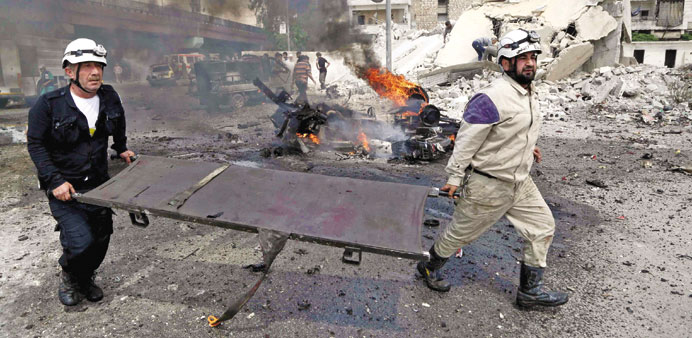Civil defence members carry a stretcher at the scene of the barrel bomb attack in Aleppo yesterday.
AFP/Beirut
At least 20 people were killed yesterday in a regime barrel bomb attack on a mini-bus stand in a rebel-held part of Syria’s Aleppo city, a monitor said.
“Helicopters committed a massacre, dropping a barrel bomb on a mini-bus station in the Fardous district of Aleppo, killing 20 civilians, among them children, and injuring 30 more,” the Syrian Observatory for Human Rights group said.
The Britain-based monitor said the toll was expected to rise because of the number of serious injuries among the wounded.
The group said the bodies of most of those killed “were charred”.
Video footage distributed by activists and posted on YouTube showed rubble and twisted scraps of metal strewn across the cratered pavement where the station was, underneath a bridge.
Firefighters and civilians worked with hoses to tackle fierce blazes in several vehicles that produced thick clouds of smoke.
A least one car had been flipped on its side.
A second video showed several men hoisting a male victim missing a large section of the back of his torso onto an orange stretcher and into an ambulance.
It was unclear whether he was still alive.
Once Syria’s economic powerhouse, Aleppo was been divided between government control in the city’s west and rebel control in the east since shortly after fighting there began in mid-2012.
For months, the regime has waged an unrelenting aerial campaign against the opposition-held part of the city, making particular use of crude so-called barrel bombs.
Rights groups criticise the weapons as indiscriminate and say they are more likely to cause civilian casualties.
More than 220,000 people have been killed in Syria since anti-government protests broke out in March 2011 spiralling into civil war in the face of a bloody crackdown by security forces.
The lives of more than 5mn Syrians, including 2mn children, are at risk from explosive weapons used in the conflict, a non-governmental organisation said yesterday.
Handicap International warned that explosive weapons were being widely used in heavily populated areas in violation of international law, and that unexploded ordnance posed a long-term threat.
“In total, 5.1mn people—including 2mn children—are living in areas highly affected by the use of explosive weapons, creating an immediate and long-term threat to their lives,” the NGO said.
It said use of the weapons by all parties to the conflict was having “dreadful consequences for civilians”.
“Because of their blast or fragmentation effects, explosive weapons kill or generate complex injuries,” the group’s regional co-ordinator Anne Garella said.
“The wide use of explosive weapons combined with the lack of appropriate surgical care in Syria has a devastating impact on people’s lives.”
The group’s study found explosive weapons had been “massively used” by all parties to the conflict, accounting for more than 80% of all recorded incidents of violence.
Three-quarters of incidents involving the weapons were in densely populated areas, suggesting “that the belligerents have no intention of effectively distinguishing between civilians and combatants, a violation of international humanitarian law”, the report said.
The group noted that explosive weapons also pose a longer-term threat, creating injuries that can leave the wounded permanently disabled, but also exposing the population to unexploded ordnance.
“The impact of explosive weapons thus goes beyond the immediate casualties: the presence of explosive remnants of war remains an obstacle not only for the security and the wellbeing of the civilian population, but also for the overall reconstruction of the country.”
Handicap International urged parties to the conflict to end the use of explosive weapons in densely populated areas, and to facilitate humanitarian access to those injured.
It called on the international community to condemn the use of explosive weapons in populated areas and to enforce a UN Security Council resolution demanding unfettered humanitarian access in Syria.
The Syrian government has been repeatedly condemned for its widespread use of barrel bombs, crude weapons made from oil drums, gas cylinders or water tanks, packed with explosives and scrap metal and dropped from helicopters.
Rebel groups have been condemned for their use of rudimentary rockets that lack targeting mechanisms and have repeatedly hit civilian areas.

